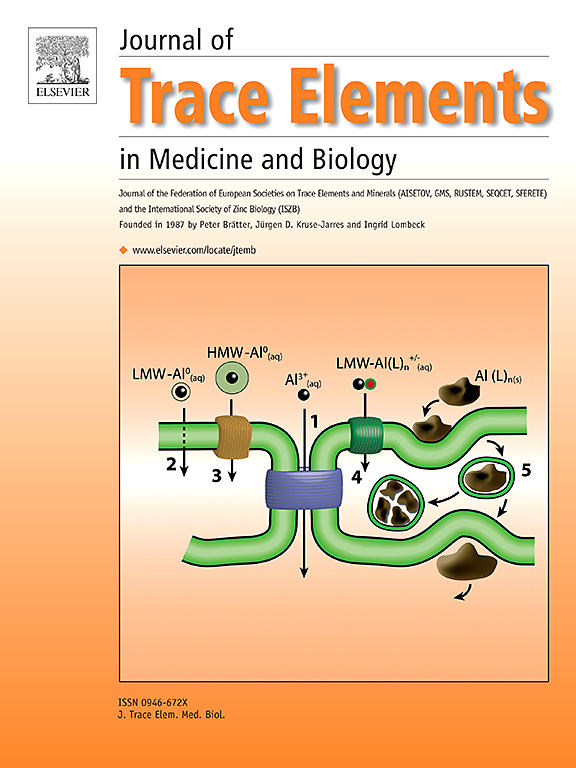成人糖尿病患者镁耗尽评分与全因死亡率和心血管死亡率的关系
IF 3.6
3区 医学
Q2 BIOCHEMISTRY & MOLECULAR BIOLOGY
Journal of Trace Elements in Medicine and Biology
Pub Date : 2025-09-18
DOI:10.1016/j.jtemb.2025.127761
引用次数: 0
摘要
本研究旨在探讨美国成人糖尿病患者镁衰竭评分(MDS)与全因和心血管疾病(CVD)死亡率之间的关系。材料和方法1999年至2018年期间从NHANES收集数据,并与国家死亡指数一起用于跟踪死亡情况。采用Cox比例风险模型计算MDS的全因死亡率和CVD死亡率的风险比(hr)和95% %置信区间(CIs)。Kaplan-Meier生存分析采用对数秩检验。在考虑混杂变量的同时进行亚组分析。结果共纳入7078例成人糖尿病患者。该研究共观察到1904例全因死亡和542例心血管疾病死亡,中位随访期为88个月。校正所有相关因素后,与MDS = 0相比,MDS≥ 3的全因死亡率HR为1.47(95 % CI: 1.21-1.77), CVD死亡率HR为1.89(95 % CI: 1.31-2.72) (P为趋势<; 0.001)。全因死亡率的hr为1.13(95 % CI: 1.07-1.19),心血管疾病死亡率的hr为1.24(95 % CI: 1.13 - 1.37)。相关性强度受年龄(相互作用p = 0.003)和高血压(相互作用p = 0.001)的显著影响。亚组分析结果显示,MDS和CVD死亡率在不同亚组之间存在恒定的关联(p均为相互作用>; 0.05)。结论本研究结果提示,MDS高的糖尿病患者全因死亡和心血管疾病死亡风险增加。及时的干预,特别是那些MDS为3或更高的人,可能会降低这种风险。本文章由计算机程序翻译,如有差异,请以英文原文为准。
Association of Magnesium Depletion Score with all-cause and cardiovascular mortality in adults with diabetes
Background
This study was to investigate the associations between Magnesium Depletion Score (MDS) and all-cause and cardiovascular disease (CVD) mortality in American adults with diabetes.
Materials and methods
Data was gathered from NHANES between 1999 and 2018 and utilized together with the National Death Index to track deaths. Cox proportional hazards models were used to calculate hazard ratios (HRs) and 95 % confidence intervals (CIs) of MDS for all-cause and CVD mortality. Kaplan–Meier survival analyses were performed using log-rank tests. Subgroup analyses were conducted while accounting for confounding variables.
Results
A total of 7078 adults with diabetes were included in this study. This study observed a total of 1904 all-cause deaths and 542 deaths due to CVD over a median follow-up period of 88 months. After adjusting for all relevant factors, HR of MDS ≥ 3 was 1.47 (95 % CI: 1.21–1.77) for all-cause mortality and 1.89 (95 % CI: 1.31–2.72) for CVD mortality compared to MDS = 0 (P for trend < 0.001). The HRs were 1.13 (95 % CI: 1.07–1.19) for all-cause mortality and 1.24 (95 % CI: 1.13–1.37) for CVD mortality. The strength of the correlation was significantly affected by age (p for interaction = 0.003) and hypertension (p for interaction = 0.001). The subgroup analysis findings demonstrated the constant association between MDS and CVD mortality across various subgroups (all p for interaction > 0.05).
Conclusion
The findings of this study suggest that individuals with diabetes who have a high MDS may have an increased risk of all-cause and CVD mortality. Timely interventions, particularly in those with an MDS of 3 or higher, could potentially mitigate this risk.
求助全文
通过发布文献求助,成功后即可免费获取论文全文。
去求助
来源期刊
CiteScore
6.60
自引率
2.90%
发文量
202
审稿时长
85 days
期刊介绍:
The journal provides the reader with a thorough description of theoretical and applied aspects of trace elements in medicine and biology and is devoted to the advancement of scientific knowledge about trace elements and trace element species. Trace elements play essential roles in the maintenance of physiological processes. During the last decades there has been a great deal of scientific investigation about the function and binding of trace elements. The Journal of Trace Elements in Medicine and Biology focuses on the description and dissemination of scientific results concerning the role of trace elements with respect to their mode of action in health and disease and nutritional importance. Progress in the knowledge of the biological role of trace elements depends, however, on advances in trace elements chemistry. Thus the Journal of Trace Elements in Medicine and Biology will include only those papers that base their results on proven analytical methods.
Also, we only publish those articles in which the quality assurance regarding the execution of experiments and achievement of results is guaranteed.

 求助内容:
求助内容: 应助结果提醒方式:
应助结果提醒方式:


